dissolved lime – YES | OSMOSIS - No!

The magnetic lime conversion for every building size. OXYSPIN AQUA AID MAGNETS
Water quality depends on the region - Whether soft or hard water comes out of the tap depends on the region in which you live. According to the Federal Ministry for the Environment, Nature Conservation and Nuclear Safety, for example, the water in Frankfurt am Main is very hard, in Hamburg it is medium and in Nuremberg it is soft. The different water hardnesses arise when rainwater seeps into the ground and becomes groundwater. Depending on the type of rock in the subsoil, minerals dissolve in the water - including the hardness components calcium and magnesium. The higher the concentration of hardeners, the harder the water. This is then visible through white deposits on fittings and in the kettle.
Limescale in the water is not harmful to health - a consolation for all those who struggle with hard water: it is not unhealthy. Hard water does not cause calcification. Calcium and magnesium are rather important components of the diet. However, if you want to cover your daily need for these minerals through drinking water, you would have to drink a whole bucket of water. Only about 100 grams of Emmental would have the same effect.
Energy consumption - There are water softening systems that can be used to treat tap water. But these are not undisputed.
Hard water leads to higher energy consumption, experts say.
Lime deposits form which, as lime sludge, represent a breeding ground for bacteria such as E.coli, Legionella, Helicobacter pylori, pseudomonas and many more. Every homeowner should absolutely avoid this, especially in the tap water installation.
Water softening systems are controversial - The Federal Environment Agency does not consider water softening systems to be sensible. The reason: All additional installations in the domestic tap water installation must be regularly serviced by a professional - otherwise not only devices and installations suffer, but also the quality of the tap water. Because these systems can become contaminated or pollutants can be released from the device and given to us via the tap water.
The Stiftung-Warentest also advises against water softening systems, ion exchangers or desalination systems, as they are also known. Such a treatment of tap water in the household is always not recommended. It can even worsen the water quality if used incorrectly. Especially the ion exchangers are often a burden for the tap water. Because these dosing systems add phosphate and silicate to the water. These are intended to reduce corrosion of the pipes.
However, phosphate in drinking water is undesirable.



